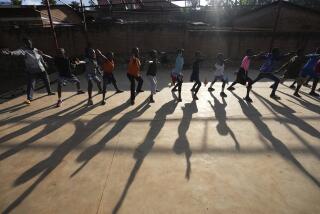GRANADA HILLS : Grisly Images Trouble Guests From Rwanda
- Share via
The only remaining connection Cyprien Munyandamutsa has to his native Rwanda are the grisly images of disease and death that flash nightly across the television screen at his daughter’s house in Granada Hills.
The countryside where Munyandamutsa, 70, and his wife, Esther Nyiramandwa, 64, lived in the south of Rwanda is deserted, and more than 200 relatives including their parents, brothers, sisters, aunts, uncles, cousins and an 18-year-old adopted son are dead.
The couple had been in Utah and California for a year and a half when the bloodshed began in April, visiting their seven children who had left Rwanda at different times for the United States.
Now they have no choice but to watch the horrors unfold, and wait.
“It is very hard,” Munyandamutsa said. “But if I was there, I could not do anything except die with the others.”
They would like to return to the southern Rwandan countryside where they grew vegetables and fruit and raised sheep, cows and chickens, Munyandamutsa said. He would like to continue his work as a preacher in the nearby village of Kibuye. But most of the Rwandans not killed in the massacres sparked by the downing of Rwandan President Juvenal Habyarimana’s plane on April 6, fled to Zaire where many are still dying of cholera and dysentery.
“It is not easy,” Munyandamutsa said. “We are old. We don’t know how long we will have to stay.”
In the meantime, Munyandamutsa and Nyiramandwa, who are Tutsi and have been married for 45 years, are living with their daughter and her husband in Granada Hills. Seven of their nine children moved to the United States to study over the last couple of decades, but this was the parents’ first visit.
Munyandamutsa began taking English classes at the Rinaldi Adult Center in Granada Hills shortly after he arrived in the Valley in December, 1992. Administrators at Rinaldi found out he was Rwandan and asked what they could do.
“I said maybe they could help the many children orphaned by the war,” he said.
The school is starting a collection drive this week, asking students to give what they can to the Adventist Development and Relief Agency International (ADRA), an agency Munyandamutsa chose, which has operated in Rwanda since 1979.
“I believe there are a lot of people who really want to help out,” said Tamara Boehmke, a spokeswoman for ADRA. “I told them I would make sure that whatever they donate will help in Rwanda.”
Munyandamutsa said he believes the aid will help. But he said it is difficult to think of the future with the losses still so close to his heart. “I am very sad for my country,” he said. To send contributions for the Rwanda relief effort, call ADRA at (800) 424-2372.
More to Read
Sign up for Essential California
The most important California stories and recommendations in your inbox every morning.
You may occasionally receive promotional content from the Los Angeles Times.










